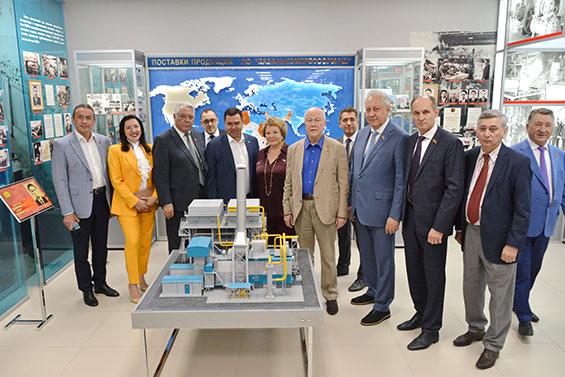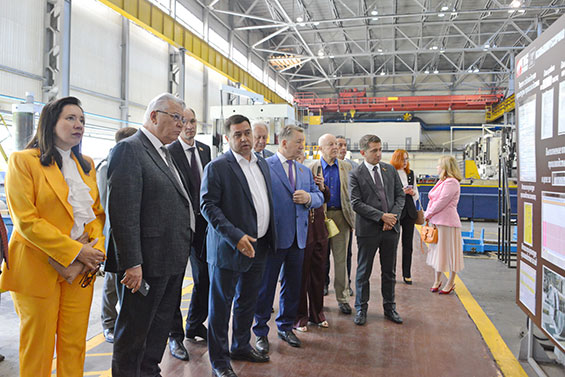Kazanсompressormash held discussion on digitalization of industrial enterprises issues

The introduction of digital technologies in the production sector of the economy and the implementation of the national project “Labor Productivity” was discussed at an off-site meeting of the Committee on Economy, Investment and Entrepreneurship, which was held today at the Kazan Compressor - Building Plant. In addition, the parliamentarians, heads of relevant ministries and agencies, representatives of the expert and business community discussed import substitution issues, as well as considered a number of federal bills.

Today's meeting of the specialized committee at the Kazancompressormash site, a leading manufacturer of compressor equipment for various industries, was not accidental. The plant successfully implements “lean production” tools and import substitution programs. In particular, the company's management has done a lot of work to get rid of imported components, and the products manufactured are mainly aimed at the Russian market. Currently, the plant produces, among other things, modular compressor units, which do not contain a single imported part.
Before the meeting, the parliamentarians accompanied by Ilnur Sagdiyev, Managing Director of Kazan Compressor-Building Plant, visited the assembly and testing shops and familiarized themselves with the plant's new projects. Assembly shop No. 8 is the main production shop and performs all types of assembly work. It also performs hydro-testing and assembly of centrifugal compressors.

Kazancompressormash test facility is one of the largest in Europe, with it’s 35 test benches and the ability to test complete units, which ensures one hundred percent control of compressor technical characteristics during testing and their confirmation on site.


The main topic of the plenary session of the committee was the formation of the foundations of the 4.0 technological platform in the machine building industry of the republic, the main components of which are digital technologies, labor productivity and import substitution.
“The republic has achieved significant results in the development of digital technologies in the system of state and municipal administration, in the activities of organizations, in the provision of public services, - emphasized the Chairman of the Committee on Economy, Investment and Entrepreneurship Lutfulla Shafigullin, opening the meeting, - in the framework of sectoral digitalization projects are being implemented in health care, ecology, education and culture, construction, agriculture, housing and utilities”.
At the same time, as Mr. Shafigullin noted, the issues of digitalization of industrial production are still given “insufficient attention”. Digital projects require significant financial investment by each enterprise,” said the head of the specialized committee, ”however, the effect that can be achieved as a result of creating a unified system, which integrates the entire infrastructure of the company, will definitely exceed the investment, as investments in digital technologies are primarily used as a way to reduce costs”.
Lutfulla Shafigullin did not rule out that one of the reasons for the lack of digitalization in production may also be the fact that each enterprise creates its own digital platform and it is not correlated with the platforms of other enterprises - partners, suppliers and customers in their interaction. Among the positive examples of industrial digitalization, the head of the relevant committee reffered to KAMAZ PJSC , where the Digital Transformation Center was established. In the first year of its operation, the company was able to increase sales by 21%.
According to Rustam Khidiyatullin, Deputy Minister of Digital Development of Public Administration, Information Technologies and Communications of RT, successful digital transformation of enterprises requires a clear strategy, competent management and introduction of digital culture. The last link, as a rule, is in a poor shape most often. Digital skills training in the republic takes place at Innopolis, the IT Park, and leading universities of the republic. Interactive courses where the acquired knowledge can be tested on the basis of a specific enterprise have also become popular.
The “kITyk” program to support IT companies has been successfully implemented in Tatarstan for more than a year. IT companies with a staff of not more than 100 people can become participants of the program. They are entitled to a simplified tax regime of 1% for “Income” and 5% for “Income minus expense”.
Marat Galeyev, member of Parliment, suggested that the relevant ministry develop “end-to-end solutions” that could be used at different enterprises facing similar problems in digitalization.
Special attention at the meeting of the Committee was paid to the issues of implementation of “Labor Productivity” - Tatarstan national project.
“After the introduction of sanctions and lengthening of import logistics chains in Russia, there was a sharp jump in demand for products manufactured in the country,” Lutfulla Shafigullin noted, ”it is that one national project that will help to cope with the increased volume of demand". Its name contains no “import substitution” words, but, in fact, when the efficiency of the enterprise is improved, its competitiveness grows, output volumes increase, and this makes it possible to substitute products that used to be supplied from other countries”.
The national project has been implemented in the republic since 2018, and today Tatarstan is among the top three in the rating of regions. According to Marat Akhmerov, Director of the Center for Energy and Resource Efficient Technologies of the Republic of Tatarstan, 176 enterprises of the republic are currently participants of the National Project.
Also at the committee meeting this day, parliamentarians considered a bill to amend federal laws on consumer protection and on information, information technologies, and the protection of information. According to Rinat Gaizatullin, Deputy Chairman of the Committee on Economy, Investments and Entrepreneurship, the bill, which was prepared within the framework of counteracting foreign sanctions, proposes to provide for the creation of a Russian application store, which will be mandatorily pre-installed on technical devices. At the same time, software will also be downloaded to such an app store.
The bill on amendments to the federal law on special economic zones in the Russian Federation, which was also considered at the committee meeting, establishes a concessionaire's pre-emptive right to receive a land plot in a special economic zone. The document simplifies the process of obtaining resident status by a concessionaire, reduces the number of verification procedures, and approves the procedure for calculating rent for land plots.
Both bills were supported by members of the core committee and will be considered at the State Council meeting this July.
Source: https://gossov.tatarstan.ru



